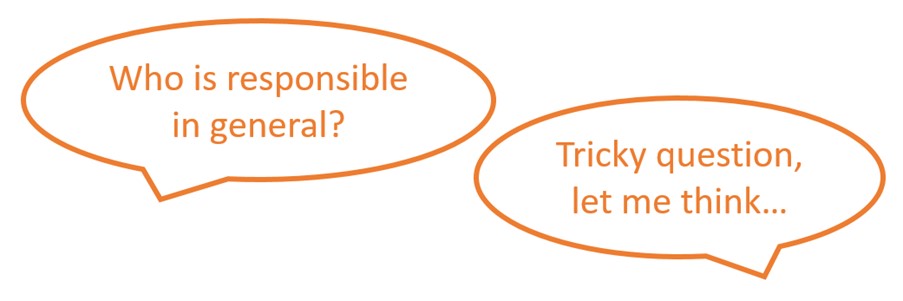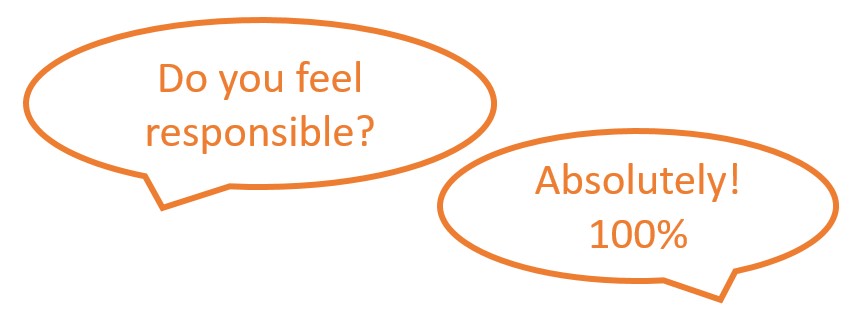In research interviews with product designers about sustainable design projects, several patterns were found in terms of how different types of questions about responsibility for sustainability were answered.
Extracts from transcripts of the interviews which show these patterns are provided below. You will notice some numbers in brackets – these indicate pause lengths in seconds and tenths of seconds. ‘Huhuh’ indicates laughter.

In this extract, the designer is asked who took responsibility for the final design outcome. He gives a somewhat tentative answer that associates seniority and professional experience with taking responsibility.
Interviewer: and (1.8) i guess (.9) for this design project (.4) what were the lines of responsibility who took responsibility for the final design
Participant: (2.0) er so that would be my kind of senior colleague who is our (.4) i guess you would call him our cto (.4) erm our chief technology officer he’s a i think he’s a he’s a he’s a he’s been an engineer for a very long time (1.4) he’s in his late fifties erm he’s kind of been part of many big projects before
Interviewer: yeah
Participant: he’s got a lot of experience and i think he probably holds on to a responsibility for this particular product
From an interview with a product designer in the UK.

This time, the designer is asked who she thinks is responsible for how sustainable the product turns out to be. She hesitates, and then provides an explanation as to why she can’t be responsible as the designer, despite common assumptions, since she doesn’t have the decision-making power. The designer acts as if she might be being directly held to account for product outcomes, and focuses on quashing this assumption.
Interviewer: and so who do you think’s responsible for (.7) the sustainability the true sustainability of the design
Participant: (2.7) so here’s where it gets very complicated because (.6) you know i’ve been in the circular economy programme with the (.3) ellen macarthur (.8)
Interviewer: yep
Participant: foundation and i’ve been in other sustainable (.6) conferences and they’ll go ’↑oh ↑yeah we we need to educate the designers to
Interviewer: mhm
Participant: make the right decision and do’ (.2) ’well (.4) er can i (.3) speak’ because i don’t have power when it comes to (.4) making a final decision (.4) again if ((company name)) (.5) thought ‘well we can afford these RPET materials you want to do (1.0) but guess what it’s not going to happen’ and they are going to say ’so put this other materials that we can afford’ (.7)
Interviewer: yeah
Participant: and what do you do i mean it’s not like it’s your company (.6) and you’re just getting paid to do as you’re told at the end of the game
From an interview with a product designer working in the Netherlands.

Here, the designer is asked who is responsible for the sustainability of products in general. This broad framing allows the participant to talk through the possible options and acknowledge the complexity of assigning responsibility to any specific individual or group.
Interviewer: so who do you think (.8) is responsible for the sustainability of products
Participant: (.9) the sustainability of products
Interviewer: of products yeah
Participant: i think that it’s (.5) okay obviously those that put the products out there (.5) er and i know that there is a demand for it in the part of consumers asking for it because they’re consuming (.5) but i think the responsibility is the from those that create it (.8) in the first place (.5) er and then we can take individual responsibilities for the choices we make
Interviewer: mhm
Participant: (.6) but without the right information it’s also hard to make the correct choice so when information is not given
Interviewer: yeah
Participant: i think there’s a bunch of stakeholders that are responsible
Interviewer: (.8) sure
Participant: (inaudible) responsibility to everybody
From an interview with a product designer from Brazil.

In this final extract, the designer is asked if she feels responsible for product outcomes. There is a strong affirmative response, a claim of guilt, and laughter, signalling the uncomfortableness of the topic.
Interviewer: yeah so do you you mentioned responsibility do you feel a responsibility as a a designer for (.6) these wider impacts of what you’re producing
Participant: (1.2) yeah absolutely (.3) um (.9) a lot of guilt (huhuhuhuhuh)
Interviewer: (huhuh) okay
Participant: (.6) sort of like ‘oh god do we need to produce another product’ (huhuh)
Interviewer: yeah
Participant: um (.6) but yeah (.3) sort of (.3) yes i feel responsible (.8)
From an interview with a product designer in Germany.
Key takeaway points
- How we talk about responsibility to others matters.
- We can talk about responsibility for sustainability in organisations in various different ways, constructing different meanings.
- Responsibility is commonly associated with decision-making power.
- Some ways of asking others about lines of responsibility may be treated as accusatory and be met with deflection.
- Framing responsibility as a feeling can be associated with personal motivation but also with reflective guilt.
